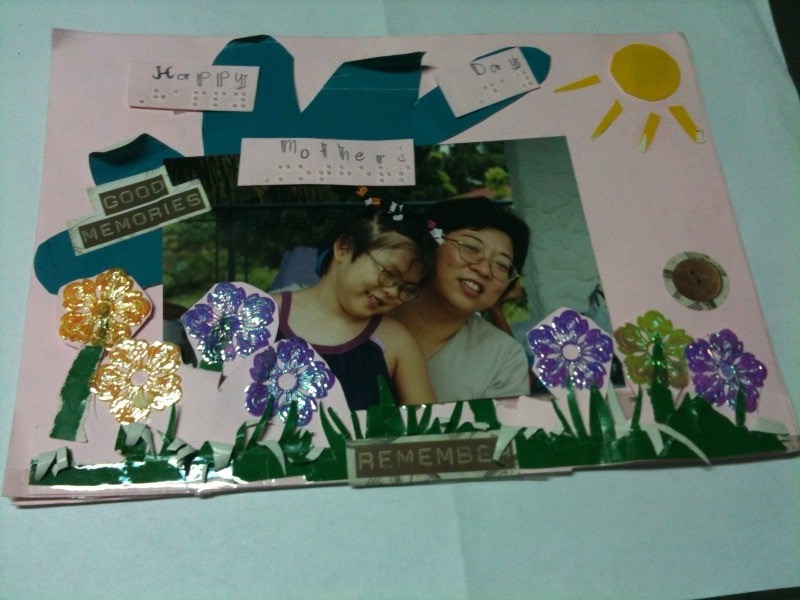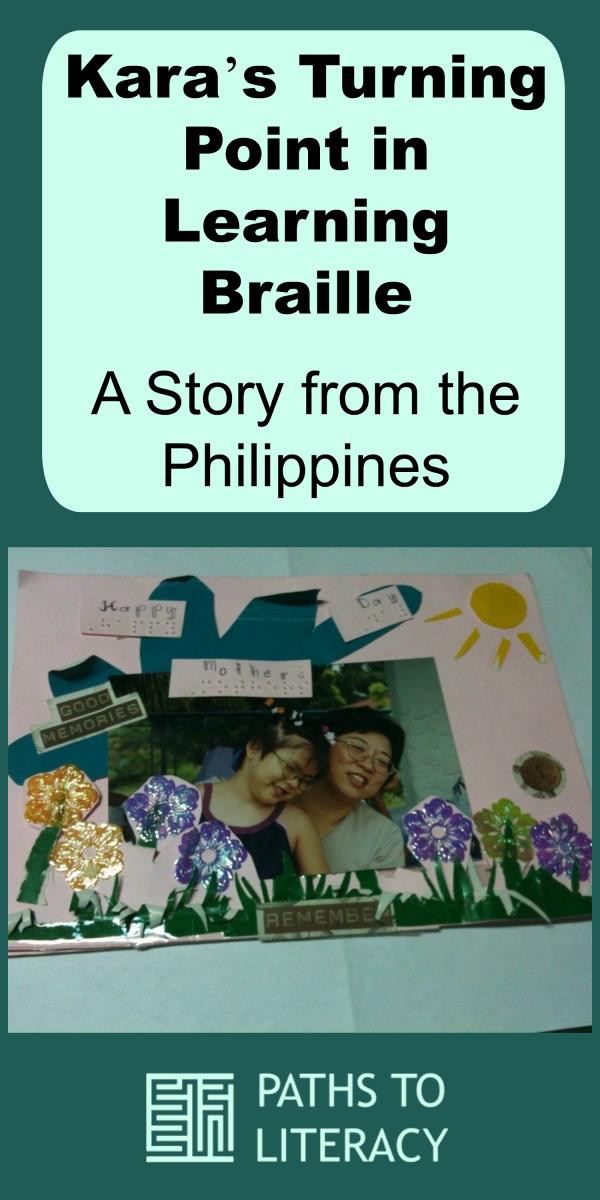Kara’s Turning Point in Learning Braille: A Story from the Philippines
 My daughter Kara was born on 10/14/1998, at 6.5 months gestation. She weighed 1.2 kgs, and had an extremely difficult survival course. As a result, she is blind due to retinopathy of prematurity, she also has mild cerebral palsy and has global developmental delays.
My daughter Kara was born on 10/14/1998, at 6.5 months gestation. She weighed 1.2 kgs, and had an extremely difficult survival course. As a result, she is blind due to retinopathy of prematurity, she also has mild cerebral palsy and has global developmental delays.
We started her early intervention program when she was barely a year old, and enrolled her at the preschool of Resources for the Blind, Inc. when she was three. There we learned that we should raise her to be as independent as possible. In the preschool, she progressed well in her daily living skills, but showed little potential in academics. She had weak finger strength because of her cerebral palsy and her poor tactile skills. She got frustrated easily when we introduced braille to her. At times we were tempted to put a stop to her academics. However, for some reason, we held on.
Learning the Purpose of Writing
In 2010, Kara had this habit of tearing whatever papers she could get hold of. She was amused when I got hysterical seeing her tearing an important paper. When we got into fights over this, she loved the attention she got. One night, she was at it again, she got hold of a piece of paper, and waved it, anticipating a gasp or a shout from me. Exasperated, I said, “Kara, paper is not for tearing, it is for writing.” She paused, ”writing for what?” Out of the blue, I uttered, “paper is for writing letters. You know, you can write a letter to Misha.” Sensing that I caught her interest, I continued, “yes, you can write Misha, tell her you miss her, ask her to come visit you”. Getting totally excited, she said, ”what do I say, Mommy, to Misha?” I said, “you tell Misha you miss her, you love her, and invite her to come visit you”. For the whole evening, she kept repeating the 3 sentences. The next day, when she went to her tutor in braille, I told her to ask her teacher, Joyce Lopez, to help her write that letter.
Writing Her First Letter to a Friend
That afternoon, she came home, waving a rather worn out paper, there on the paper were the 3 sentences she wrote painstakingly: “MISHA I LOVE YOU, I MISS YOU, PLEASE VISIT ME IN MANILA”. It took her 1.5 hours to finish this, but there was no complaining, no tantrums.
The next day, we told her that the paper was a little bit untidy, so she repeated writing the letter. This time it took her 40 minutes.
Misha is from Malaysia. She is visually impaired with multiple disabilities. Kara and Misha were born one month apart. In 2003, Misha came to study in the preschool of Resources for the Blind, Inc. for a year and she was our neighbor. Though the two girls could hardly converse, they love each other. When Misha returned to Malaysia, sometimes they talked over the phone. The conversation was simple enough: “Misha how are you?” “I am fine Kara. I love you Kara”.
In Feb, 2010, we visited Misha’s family in Malaysia. The two girls were happy to see each other. When we got back, Kara kept asking when she would see Misha again. The idea of writing to Misha was enough catalyst for Kara to learn braille.
Finding Meaning in Braille
That summer of 2010, she found a meaning in braille. Braille is not just for feeling the dots, for punching the keys on the brailler. It is for telling her friend she loves her, it was for saying happy birthday to her grandma. That summer, I got a card from Kara, “mommy, I love you, happy mother’s day!” Her Happy Father’s Day card is now displayed by the proud daddy in his office.
That summer, she found great interest in spelling, she had to know the spelling of words so she could use them in writing. Oh that summer was the beginning of all beautiful things in her learning.
Kara has many limitations. Now, 2 years after that milestone in braille, she can read about 12 words per minute, she can write with the same speed. She is now in Grade 1 regular class. She still has a lot to catch up, but to me, this progress has been beyond my imagination. We were torn between whether to continue teaching her braille for so many times, but something in Kara told us to hold on. Time and again we lost heart, and we were on the verge of giving up. How I am glad I didn’t!
Kara is now 14 years old. She speaks English, Filipino & Chinese clearly. She walks with assistance and her mental age is about 6-7 years old. She is a happy child, friendly and well behaved.
I am extremely thankful to all our teachers, our therapists, our fellow parents who kept telling us not to give up. Yes, the milestone came a long time after, but just because it was so late in coming, it was superbly wonderful!
I hope by sharing Kara’s story I can encourage other parents to not give up, to keep on believing in their children. It is only when we believe in our children, that they will surprise us and make us proud!
Editor's note: We thank the Choy family for sharing this story about how functional literacy activities can be motivating to children and youth who are blind or visually impaired, including those who are deafblind or who have multiple disabilities.

